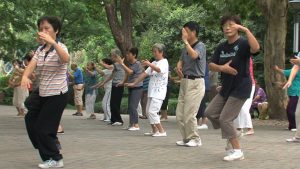Improve Mental and Physical Health in Anxious, Depressed Patients with Mindfulness and Qigong
By John M. de Castro, Ph.D.
“You might think ‘I’m late, I might lose my job if I don’t get there on time, and it will be a disaster!’ Mindfulness teaches you to recognize, ‘Oh, there’s that thought again. I’ve been here before. But it’s just that—a thought, and not a part of my core self,’” – Elizabeth Hoge.
Anxiety disorders are the most common mental illness, affecting 40 million adults in the U.S., or 18% of the population. A characterizing feature of anxiety disorders is that the suffer overly identifies with and personalizes their thoughts. The sufferer has recurring thoughts, such as impending disaster, that they may realize are unreasonable, but are unable to shake. Depression often co-occurs with anxiety disorders. Anxiety and depression are generally treated with drugs. But there are considerable side effects and these drugs are often abused. There are a number of psychological therapies for anxiety and depression. But, about 45% of the patients treated do not respond to the therapy. So, there is a need to develop alternative treatments.
Recently, it has been found that mindfulness training can be effective for anxiety disorders. Mindfulness has also been shown to be effective for depression. Mindfulness-Based Cognitive Therapy (MBCT) was specifically developed to treat depression and has been shown to be very effective. In addition, mind-body practices such as qigong have also been shown to be effective for anxiety and depression. Recently, qigong practice has been combined with Cognitive Behavioral Therapy (CBT) to treat anxiety and depression. The relative efficacy of MBCT and qigong-Based Cognitive Therapy has not been tested.
In today’s Research News article “A randomized controlled trial on the comparative effectiveness of mindfulness-based cognitive therapy and health qigong-based cognitive therapy among Chinese people with depression and anxiety disorders.” (See summary below or view the full text of the study at: https://www.ncbi.nlm.nih.gov/pmc/articles/PMC7734764/ ) Chan and colleagues recruited adults who had been diagnosed with either an anxiety disorder or depression and randomly assigned them to either a no-treatment control condition or to receive 8 weekly 2 hour sessions of either Mindfulness-Based Cognitive Therapy (MBCT) or Qigong-Based Cognitive Therapy (a combination of Qigong practice along with Cognitive Behavioral Therapy). They were measured before and after training and 8 weeks later for physical and mental health, anxiety, depression, perceived stress, sleep quality, and self-efficacy.
They found that in comparison to baseline and the no-treatment control, the participants who received either Mindfulness-Based Cognitive Therapy (MBCT) or Qigong-Based Cognitive Therapy had significantly reduced anxiety, depression, and perceived stress, and significantly increased sleep quality and self-efficacy. These improvements were either sustained or even greater still at the 8-week follow-up. The decreases in anxiety and depression were significantly greater in the Qigong group than in the MBCT group. But the MBCT group had significantly greater improvements in overall mental health than the Qigong group while the Qigong group had significantly greater improvements in physical health than the MBCT group.
These are interesting results and to my knowledge the first direct comparison of the effects of Mindfulness-Based Cognitive Therapy (MBCT) and Qigong-Based Cognitive Therapy on patients with anxiety and depression. MBCT has been previously established to significantly improve anxiety, depression, perceived stress, sleep, and self-efficacy and Qigong has similarly been established to significantly improve anxiety, depression, perceived stress, sleep, and self-efficacy. So, the improvements observed in the current study relative to the no-treatment group are expected. What is new is the findings that MBCT is superior for the improvement of mental health while Qigong is superior for the improvement of physical health in patients with diagnosed anxiety and depression.
So, improve mental and physical health in anxious, depressed patients with mindfulness and qigong.
“depression and anxiety scores were significantly decreased after participation in an 8-week mindfulness group therapy for depressive and anxious people.” – Tora Takahashi
CMCS – Center for Mindfulness and Contemplative Studies
This and other Contemplative Studies posts are also available on Google+ https://plus.google.com/106784388191201299496/posts and on Twitter @MindfulResearch
Study Summary
Chan, S., Chan, W., Chao, J., & Chan, P. (2020). A randomized controlled trial on the comparative effectiveness of mindfulness-based cognitive therapy and health qigong-based cognitive therapy among Chinese people with depression and anxiety disorders. BMC psychiatry, 20(1), 590. https://doi.org/10.1186/s12888-020-02994-2
Abstract
Background
The goal of this study was to investigate treatment outcome and related intervention processes of mindfulness-based cognitive therapy versus health qigong-based cognitive therapy versus waitlist control among individuals with mood disorders.
Methods
A total of 187 individuals with mood disorders were randomized and allocated into mindfulness-based cognitive therapy, health qigong-based cognitive therapy, or waitlist control groups. All participants were assessed at three time points with regard to depressive and anxiety symptoms, physical and mental health status, perceived stress, sleep quality, and self-efficacy. Linear mixed models analysis was used to test the individual growth model by studying the longitudinal data.
Results
Mindfulness-based cognitive therapy and health qigong-based cognitive therapy both produced greater improvements on all outcome measures as compared with waitlist control. Relatively, more reductions of mood symptoms were observed in the health qigong-based cognitive therapy group as compared with the mindfulness-based cognitive therapy group. Health qigong-based cognitive therapy is more conducive to physical health status whereas mindfulness-based cognitive therapy has more favorable mental health outcomes. Individual growth curve models indicated that alterations in perceived stress was the common predictor of mood changes in both intervention groups.
Conclusions
The predominant emphasis on physical health in health qigong-based cognitive therapy makes it more acceptable and effective than mindfulness-based cognitive therapy as applied in Chinese individuals with mood disorders. The influence of Chinese culture is discussed.
https://www.ncbi.nlm.nih.gov/pmc/articles/PMC7734764/









